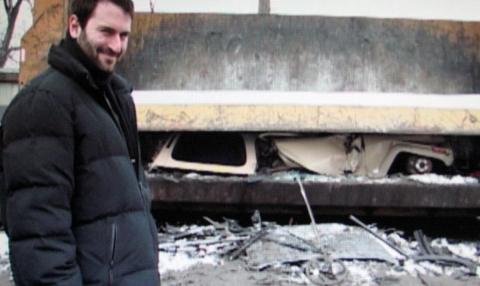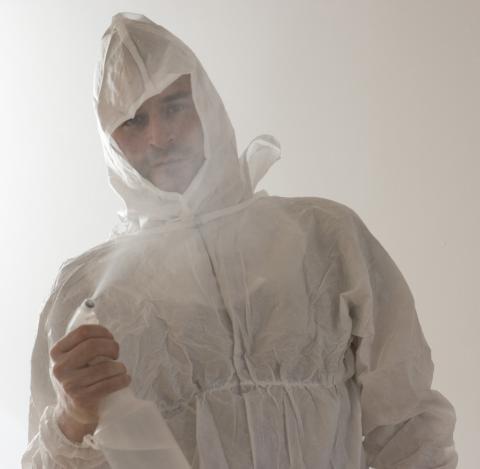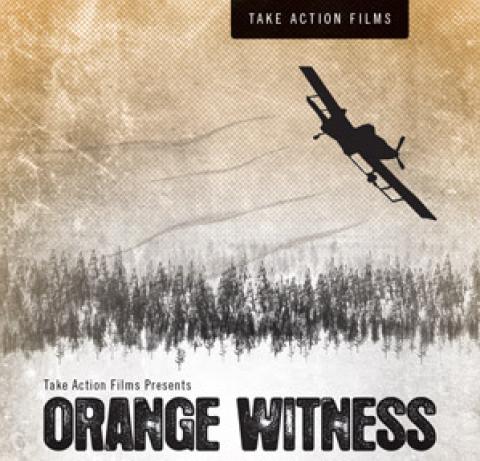
Leave it to a filmmaker to come up with the ultimate snappy tagline for his own life - "Andrew Nisker: activist, filmmaker, proponent for change."
With that, visitors to the Toronto-based documentarian's website, know immediately what they're dealing with, though they might be surprised (and delighted) to discover that humour plays as much a role in Nisker's storytelling as his passionate commitment to social reform.
Nisker's forceful yet highly amusing films — 2007's Garbage: The Revolution Starts at Home and 2009's Chemerical: Redefining Clean for a New Generation — both drive home the point that simple changes made in the household can vastly reduce everybody's environmental footprint.
In an era when environmental messaging can seem overwhelming, a straightforward theme such as that is highly resonant, and likely explains why Nisker's related work as a public speaker has been so effective. Kids get it, adults get it, educators and media get it and everybody can get on board without having to invest heaps of money or time in order to swiftly realize tangible results.
Talk about a revolution. And it pretty much all began in Nisker's backyard.
"The garbage strike in Toronto in 2002 was the 'aha' moment for my film Garbage," he tells Samaritanmag. "Garbage was being piled in Trinity Bellwoods Park near my home and I'd walk by those piles every day on my way to work, which got me thinking about where all this stuff was coming from and where it's all going.
"That got me examining my own life and my garbage creation and I began to gauge my impact on the environment. I also realized making the film that there are many ways to change your lifestyle and live more sustainably. So it occurred to me that putting a family on a kind of self-imposed garbage strike would address those questions, but also have comedic elements."
Which is precisely what Nisker did, having "an average urban family, the McDonalds [keeping] every scrap of garbage they created for three months" in their soon jammed-packed and very smelly (not to mention...ugh... maggot-y) garage.

But while waste reduction might seem obvious to 21st century urban dwellers — particularly Torontonians who've endured two citywide garbage strikes in seven years — Nisker's next film, Chemerical, drew back the curtain on something less visible but equally nefarious: dangerous chemicals lurking in everyday household items like cleaning products and cosmetics.
"Chemerical kind of grew out of [the making of] Garbage," he says. "I wanted to look at all the different ways people pollute. I learned that indoor air quality is 10-to-50 times worse than outdoor air quality and it's because of the cleaning products we use and what's in those cleaning products.
"So I started researching and discovered that by using these products, we are not only compromising our homes and ourselves, but also compromising the water that goes down our drains. These products are unnecessary and expensive and damaging, and I wanted to answer the question, 'Is there a way to live at the same standard but have less of an environmental impact?' And the idea of putting a family to the challenge worked so well with Garbage that I decided to do it again with Chemerical."
Asked whether the industry has come out swinging against the film, Nisker says, "Happily, no. What can industry say? They already have warnings on their products -- avoid getting this in your eyes or call poison control if you ingest. And the government permits sale of these products which is why, I think, that industry hasn't really responded.
"Still, in the last five years there has been an explosion of natural green products because industry is realizing people are waking up to the potential dangers of chemically-laced products. And if people are switching to green products, industry is going to want to grab those dollars, too."
Talking to Nisker — who is by turns funny, fervent and self-deprecating — it almost feels like if he didn't exist, the world would have to invent him. He bluntly admits his earliest ambition was to be a musician (his first cousin is Merrill Nisker, a.k.a. guerilla musician and performance artist Peaches) but that dream was not to be.
"When I was 12 years old, I washed dishes for a year and bought my first electric guitar, which I still have and I was never any good at playing it," admits Nisker, who clearly has an ear for music; enter Broken Social Scene's Brendan Canning who scored Garbage and Holy Fuck who scored Chemerical.
Nisker continues: "At one point, I was in a band with the guys who would be in the Philosopher Kings — that's my claim to fame — but I decided a camera would be a more powerful tool for social change.
"I always had a desire for activist work," he continues. "For me, the experience with film -- of going in and watching and forgetting about your own issues and problems while being entertained and informed — was incredibly powerful. Films like The Killing Fields about the massacre in Cambodia and later, Roger Moore's film, Roger and Me, really inspired me and woke me up to what you could do with a camera from a documentary perspective."
After finishing film school at York University, Nisker landed an apprenticeship of sorts working with Broadway Video, operated by Lorne Michaels of Saturday Night Live fame.
"I wrote a screenplay called Death, Family and Religion (a black comedy about a shiva) and they optioned it, so I was in development with them and working at their office writing and re-writing the screenplay. I also had shot a pilot TV series, a variety show which they had optioned also. That was around '93, '94."
Today, when not taking his movies on the road or managing the operational aspects of his Take Action Films company, Nisker teaches a course at OCAD University and hangs with son, Sebastian, and is expecting a baby this summer with fiancee Lindsay.

"I am certain I make an impact. Is it 10 percent, 100 percent, I don't know. But it's real," Nisker says of his films and outreach work, admitting that the biggest hurdle to growing his dossier is securing funding.
"Even if you impact one person in an auditorium, they will go back and tell friends and family and it grows from there. As [late environmental reporter and Greenpeace co-founder] Bob Hunter said, the revolution starts at home. Little changes made at home have a wider impact on the environment.
"I like to work from the bottom up. Obviously, we want to put pressure on government and industry to change their dirty ways, but at the end of the day small changes can have enormous impact. It could be something as simple as switching from chemical-laced laundry detergent to green laundry detergent. That really adds up when multiplied over 50 loads of laundry in a year."
Air Jordan 1 Mid "What The Multi-Color" For Sale